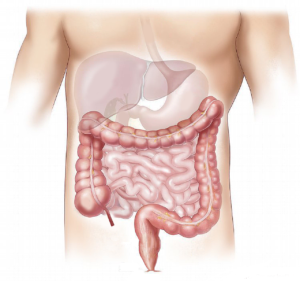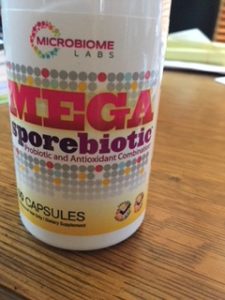Your Microbiome and It’s Impact on
Immune, Physical and Mental Health
Knowing how to support your microbiome and why you need to is even more important than ever in the time of colds, viruses including this strain of coronavirus (COVID 19). As a society we are getting unhealthier and it is up to us, not our doctors, our families or our government and health care system to take care of us. We are responsible for our own health.
What is the Microbiome?
Before we go into why your microbiome is so important for your mental and physical health, I should first provide a little information as to what the microbiome is. The microbiome is a collection of microorganisms that inhabit this mini ecosystem in our bodies. It is made up of bacteria along with fungi and viruses, all which call our bodies’ home.
We can carry up to 4 pounds of microbes in our gut. Within the tens of trillions of micro-organisms that live in there, there are at least 1,000 species of bacteria consisting of over 3 million genes. It is said that we are made up of more DNA from our microbes that our actual DNA.
Did you know that your microbiome is unique? It is so unique that it has an influence over your personal health and your risk of disease.
What Makes Your Microbiome So Unique to You?
The digestive tract of a newborn is rapidly colonized with microorganisms from the mother. However, this microbiome can be influenced by whether you were breastfed, or bottle fed, whether you were born via a vaginal birth or a C-section.
New research is also showing that the development of the gut microbiome may also begin in the womb, thus your mother’s health during pregnancy also affects your health.
Now you may think then there is nothing you can do since it was up to your mother-not so! Not only does your mother’s health and your birth affect your gut health, but also what you eat and environmental factors as well. The more diverse your gut microbiome is, the better it is for your health.
Having less diversity can impact your health in numerous ways. Research is showing that health issues such as obesity, mental health, cancer and autism is impacted by our microbiome diversity or lack of.
Why We Need a Diverse Inner Ecosystem
We not only live with these microorganisms, but we also depend on them. This complex ecosystem is made up of 100 trillion microbes that must be properly balanced and cared for if you are to be healthy. This microbiome not only lives in your gut. This eco- system of microorganisms lives in your mouth, nose, on your skin, in your throat, lungs, gut and urogenital tract.
The issue arises when your microbiome falls out of balance and symptoms start to appear. These organisms perform a multitude of functions including supplying critical vitamins to fighting pathogens, modulating weight and regulating metabolism.
These organisms make up to 70% of your immune system. Think about that during this time of quarantine. If you want a strong, robust immune system to fight off pathogens then you need to address microbiome health.
It also controls how your genes express themselves. By optimizing your native flora, you are controlling your genes.
So, if you feel doomed to get a certain condition or disease because your mother had it and so did her mother and so forth, remember this-genes load the gun but diet and life- style pull the trigger. Thus, you are in control if your genes are to turn on. You can stop blaming your parents and take control of your health!
An example is celiac disease-you may know that you have the genes for this autoimmune condition, but tests show you do not have it currently. Say you decide to continue to eat white flour products, wheat- based goods, gluten containing foods such as bread, pasta, bagels and so forth daily. Do you think your genes will eventually get turned on? Yes, more than likely at some point in time you will end up with celiac disease because your diet and lifestyle turned the gene on.
Health Risks Associated with Your Microbiome Health
let’s look at some of the health risks and how the microbiome has an impact on your health.
Immune Health: Because we are amid quarantine due to COVID 19 it is more important than ever to discuss immune support. In order to have a healthy immune system you also need a healthy gut.
Those that have been impacted the most severely from this virus are smokers, those with at least one chronic health condition and the elderly and the obese. The odds are that if you have a diet and lifestyle condition such as CVD, diabetes type 2, or HTN that your gut is not in optimal shape.
Your gut bacteria play a role in the development of white blood cells that help your body fight infections. 70 to 80% of your immune cells are found in the gut.
While you start out with a gut microbiome that is determined by your mother your diet will continue to shape it. Short Chain Fatty Acids (SCFA) which are byproducts from your gut bacteria can only be produced by certain bacteria species. SCFA are produced when you consume a diet rich in whole food fibers or when needed one can take a SCFA supplement such as butyrate. When SCFA are produced they promote the activity of regulatory T cells. These T reg. cells play a very important role in maintaining immune tolerance. In addition to this SCFA support the integrity of the epithelial barrier and decrease inflammatory response.
Consuming a whole foods diet has always been important but hopefully with the impact of COVID 19 this will make many realize the importance of a whole foods diet for our protection against viruses and bacteria. The stronger your immune system is the less risk you have for any cold, flu, other virus or bacteria that comes your way.
On his deathbed, Pasteur was quoted as saying “Bernard was right, the pathogen is nothing, the terrain is everything”. We have been so focused on the pathogen, this strain of coronavirus, but what you should be concerned about is your gut terrain. What shape is it in?
A Virus can only be contagious if the host is susceptible! Yes, some viruses are more contagious than others BUT the host must be vulnerable. You are the host! Another way of looking at this: Covid 19 is more contagious among a vulnerable population. That population includes those with weak immune systems and poor microbiome health.
When we talk about gut health, microbiome health, you hear a lot about probiotics and more recently information on prebiotics and even the post biotics (the SCFA’s) but you need other nutrients from whole foods as well.
For instance, vitamin A and vitamin D are important for the microbiome and the immune system. Vitamin A induces gut homing receptors on T cells while vitamin D suppresses gut homing receptors on T cells. Together vitamin A and D mediated regulation of the intestinal epithelium and mucosal immune system shape the microbial communities in the gut to maintain homeostasis (according to a study in Crit. Rev. Biochem. Mol. Biology, 2019, April)
Obesity: Research has found that certain strains of bacteria are found in those with low body weight. This strain is called Christensenellaceae minuta. When they introduced this gut bacterium into mice, those mice gained less weight thus indicating that having this strain may reduce or prevent obesity.
Cancer: A study published in the Journal of Cancer Research claimed that some bacteria may play a role in contributing to certain cancers such as lymphoma and stomach cancer. On the flip side, researchers have found that other gut bacteria may be important for improving the effectiveness of cancer treatment. This research suggests that microbes not only shape our predisposition to disease but also assist with recovery from it.
Mental Health: Many people still don’t realize the impact that overall gut health has on brain function. I have written elsewhere about the gut brain connection and the fact is, your gut bacteria play a very important role regarding your mental health. Having limited microbiome diversity has been associated with depression, anxiety and ADD to name a few. The gut-brain connection is a 2- way street with information traveling back and forth along the vagus nerve. Therefore, when many doctors are looking only at the health of the brain, they may be missing out by not addressing the health of the gut. If the microbiome is out of balance, if there is a leaky gut, digestive disorder etc.… then this can create toxicity in the brain.
Two large studies done in Europeans found that several different species of gut bacteria are missing in those with depression. They found that those with depression were missing Coprococcus and Dialister. They also found that depressed people had an increase in bacteria implicated in Crohn disease which suggests that inflammation may play a role.
Coprococcus makes butyrate, a post biotic, which is an anti-inflammatory substance. A post biotic is what is produced from your good gut bacteria. When you eat and digest fiber rich whole foods your gut bacteria digest this fiber and then a by product is produced called short chain fatty acids of which butyrate is one of them. These SCFA travel through the bloodstream to the brain where they act as epigenetic modulators, reprogramming some brain functions and influencing mood.
What this comes down to is that we need a healthy whole foods diet rich in fiber from a variety of food sources (not eating the same food day after day) to support gut health. One of the reasons why I do not support the use of a ketogenic diet long term, especially for those with mental health issues. (because a low carb diet is also a low fiber diet)
Autism: While there are many theories as to what contributes to this disorder, research is increasingly looking at the role of the gut and its bacteria. Research from ASU showed that children with autism possessed lower levels of three stains (Prevotella, Coprococcus and Vellonellaceae)
What Happens to Your Gut Health When You Move to the United States?
The United States has the worst gut microbiome health. This should not come as a surprise.
If you were born outside the United States and then moved to the U.S., the odds are your gut health went through a change and not for the better. A study showed that after only 9 months in the US, immigrants from southeast Asia start to lose their diverse gut microbiomes and gain one like Americans.
PJ Vangay, a grad student in computational biology looked at the changes in the microbiome. She looked at stool samples from 514 Hmong and Karen women (tribes in Thailand) before and after moving to the U.S.
This was especially interesting to me since on a trip over to Thailand we stayed with the Karen tribe for a few days so that we could go into the jungle with the mahouts to see the elephants in their natural environment. The Karen Tribe does not drink alcohol, they get a lot of daily exercise, they eat a lot of rice, and vegetables with soy, chicken and eggs as the bulk of their protein. Coconut and bananas are in plentiful supply and these are also eaten with more frequency.
But when they moved to the United States, what they ate changed….
This means that the gut had fewer stains of good bacteria and less of them.
Why is this such a big deal? Since over 70% of your immune system is in your gut, it is a very big deal!
Dan Knights, a microbiologist at the University of Minnesota stated that “Having low diversity in your microbiome is almost universally a sign of bad health, across almost every disease that has been studied”
What May Contribute to An Unhealthy Microbiome
- NSAIDS
- Sugar
- refined processed foods
- Animal meats that are fed low dose antibiotics and GMO feed.
- chlorinated water
- fluoridated water
- GMO’s
- Gluten/white flour products
- PPI’s
- stress
- herbicides, pesticides, glyphosate
- antibiotics (use only when necessary)
- pollution
- pasteurized dairy
- medications
- smoking
- food sensitivities
- celiac disease
- other autoimmune disorders
- gut pathogens, fungal infections, mycotoxins
- SIBO
Some things are beyond your control and others are within your control.
Focus on what you can control.
For instance, when on a run last Spring, they were weed spraying and I was breathing in all these toxic chemical fumes. I was in the middle of a run, not much I could do (but hold my breath!) so I relaxed, continued with my run.
But what I was in control of was giving my body antioxidant support and supporting my detoxification pathways with diet and supplements.
What Does Your Food Diversity Look like?
Take a look at your diet.
Most people (I am guilty of this too) consume the same foods, the same food groups over and over.
If you are eating the standard American diet, the bulk of your diet is sugar, pasteurized dairy, refined oils and wheat/gluten based products. Doesn’t sound very nutritious does it?
If we look at primitive cultures and indigenous tribes (of which very few are left), they consumed more plant- based foods, more roots, more tubers, more herbs, and mushrooms and overall a more diverse diet than what we eat now.
Their diets were rich in fiber coming from a wide variety of plant sources and it is believed that our ancestors diet contained roughly 100 or more grams of plant- based fiber per day. Granted they were more active than we are now, and we do not need as many carbs because of our sedentary lifestyle but we are lucky if we get 20 grams of plant- based fiber in our diet per day. Fiber is important not only for microbiome health but for bowel movement frequency, blood sugar regulation and heart health too.
The daily fiber goal in the U.S is 25 grams for women and 38 grams for men, which in my opinion is still too low, and yet it is estimated that only 5% of Americans even reach this fiber amount daily! I cannot stress enough the importance of fiber in the diet for your microbiome and thus overall health.
Dr. Kharrazian suggests that one goes to the grocery store and purchases 20 different types of leafy greens and vegetables and put them in your food processor or blender. Then take 2 tablespoons of this veggie blend per day to provide diversity in your diet. I like his option as opposed to green based powders that you can add to water. The whole food option is always best but the powders can come in handy if you are traveling but should not be your daily “go to” option.
How to Restore Your Gut Microbiome
I do support the use of supplements for gut health but the first place to start is with your diet.
If you read the rest of this article you should have an idea by now that your microbiome needs not just prebiotics, probiotics and post biotics but an array of nutrients and fiber rich foods in the diet.
The best way to do this is to optimize your gut flora through diet. This means removing processed sugars and processed carbs from the diet, swap refined grains such as gluten since it can cause inflammation for quinoa and rice. Consume a diet that is rich in whole fruit and vegetables as they will provide you with the fiber (prebiotics) for your good bacteria (the probiotics).
Add in fermented foods (which will provide some probiotic strains), raw dairy (if you tolerate dairy), plenty of leafy greens and non-starchy vegetables. You can eat higher carb rich vegetables and starchy vegetables, but these should be a smaller portion on your plate. Starchy vegetables include beets, parsnips, white and sweet potatoes. Or add in fiber rich/carb rich foods such as beans and legumes. Ideally, you do not want to go low carb as then you also go low fiber, and this is not a gut supportive diet.
Eat plenty of proteins such as grass- fed meats, organic chicken, pasture raised eggs, wild caught salmon, vegetarian protein sources such as lentils, beans, quinoa and other whole grains such as teff, millet and buckwheat.
A recent study on those who ate oatmeal for breakfast showed that it altered the makeup of their gut bacteria for the better. They believe this is because the oatmeal acts as a prebiotic. Just be sure to purchase steel cut oats, not the packets of refined, sugar laden oatmeal.
I do feel that that many of us, myself included, need at least a probiotic supplement. And others who are still working on adding in fiber rich foods may need prebiotic supplement support. Probiotics will help colonize your good gut bacteria and prebiotics are essentially food for the probiotics. Probiotic rich foods include fermented vegetables, kefir, kimchi, raw garlic, raw onions, raw asparagus, raw unfiltered apple cider vinegar such as the Bragg’s brand and Kombucha.
As for supplements, I use with my clients a prebiotic and a probiotic from Microbiome labs. If interested in using this professional line of supplements let me know.
Bottom Line: Addressing your gut health is critical for optimal overall health mental and physical health and to support a healthy functioning immune system. We are all individuals, with different health issues and on different medications and different gut microbiomes so any plan should be tailored to you. If you need support, contact me for a free 15 minute consult to see how I can be of help to you.
Sources:
Bauman, E. & Friedlander, J. (2014) Therapeutic Nutrition. CA: Bauman College.
Better Nutrition Magazine, (1/16 ) Sow your oats to save your gut. Vol 78, 1.
Mercola, J. (5/17/14) How your microbiome controls your health. Retrieved from articles.mercola.com
Whiteman, H. (3/11/15) The gut microbiome: how it affects our health. Retrieved from medicalnewstoday.com .
https://neurohacker.com/how-the-gut-microbiota-influences-our-immune-system
https://www.cell.com/cell/fulltext/S0092-674(18)31382-5








Thank you Karen, this is exactly what we need during this COVID crisis. I appreciate all your time and research.
Thank you Karen, this is exactly what we need during this COVID crisis. I appreciate all your time and research.